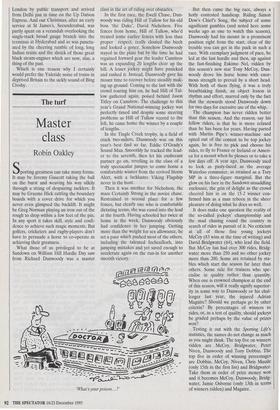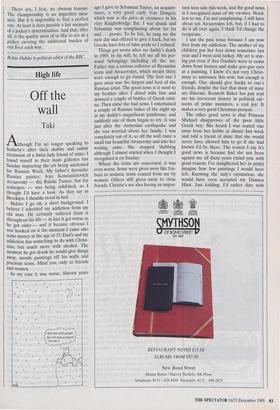The turf
Master class
Robin Oakley
porting greatness can take many forms. It may be Jeremy Guscott taking the ball on the burst and weaving his way silkily through a string of despairing tacklers. It may be Graeme Hick rattling the boundary boards with a cover drive for which you never even glimpsed the backlift. It might be Greg Norman playing an iron out of the rough to drop within a few feet of the pin. In any sport it takes skill, style and confi- dence to achieve such magic moments. But golfers, cricketers and rugby-players don't have to persuade a horse to co-operate in achieving their greatness.
What those of us privileged to be at Sandown on William Hill Hurdle Day saw from Richard Dunwoody was a master class in the art of riding over obstacles, In the first race, the Ewell Chase, Dun- woody was riding Hill of Tullow for his old boss 'the Duke', David Nicholson. Five fences from home, Hill of Tullow, who'd treated some earlier fences with less than proper respect, really clouted the birch and looked a goner. Somehow Dunwoody stayed in the plate but by the time he had regained forward gear the leader Camitrov was an expanding 20 lengths clear up the hill. A lesser jockey might have panicked and rushed it. Instead, Dunwoody gave his mount time to recover before steadily mak- ing up ground. Coming to the last with the crowd roaring him on, he had Hill of Tul- low gathered again, poised behind Jason Titley on Camitrov. The challenge to this year's Grand National-winning jockey was perfectly timed and despite some steering problems as Hill of Tullow veered to the left, he came home the winner by a couple of lengths.
In the Tingle Creek trophy, in a field of crack two-milers, Dunwoody was on this year's best find so far, Eddie O'Grady's Sound Man. Smoothly he tracked the lead- er to the seventh, then let his exuberant partner go on, revelling in the class of a truly spectacular jumper to come home a comfortable winner from the revived Storm Alert, with a lacklustre Viking Flagship never in the hunt.
Then it was another for Nicholson, the mare Certainly Strong in the novice chase. Restrained in second place for a few fences, but clearly one who is comfortable dictating terms, she was eased into the lead at the fourth. Having schooled her twice at home in the week, Dunwoody obviously had confidence in her jumping. Getting more than the weight for sex allowance, he set a pace which pushed most of the others, including the talented Inchcailloch, into jumping mistakes and yet saved enough to accelerate again on the run-in for another smooth victory.
`What's your poison...?' But then came the big race, always a hotly contested handicap. Riding Simon Dow's Chiefs Song, the subject of some significant gambles (and noted here some weeks ago as one to watch this season), Dunwoody had his mount in a prominent position right from the start, clear of the trouble you can get in the pack in such a race. With exemplary judgment of pace, he led at the last hurdle and then, up against the fast-finishing Eskimo Nel, ridden by this season's new star Tony McCoy, Dun- woody drove his horse home with enor- mous strength to prevail by a short head. With both of them flying, it was a truly breathtaking finish, an object lesson in rhythm and effort, marred only by the fact that the stewards stood Dunwoody down for two days for excessive use of the whip.
The champion has never ridden better than this season. And the reason, say his fellow riders, is that he is more relaxed than he has been for years. Having parted with Martin Pipe's winner-machine and opted out of the contest to be top jockey again, he is free to pick and choose his rides, to fly to France or Ireland or Ameri- ca for a mount when he pleases or to take a few days off. A year ago, Dunwoody used to look as pasty-faced as the average Waterloo commuter, as strained as a Tory MP in a three-figure marginal. But the glow on his face in the Sandown unsaddling enclosure, the grin of delight as the crowd cheered him in on the 15-2 winner con- firmed him as a man reborn in the sheer pleasure of doing what he does so well.
It does make one question the reality of the so-called jockeys' championship and the mad chasing round the country in search of rides in pursuit of it. No criticism at all of those fine young jockeys McCoy (83 wins at the time of writing) and David Bridgwater (64), who lead the field. But McCoy has had over 300 rides, Bridg- water more than 250 and no other jockey more than 200. Some are retained by sta- bles which start the season far later than others. Some ride for trainers who spe- cialise in quality rather than quantity. When one is crowned champion at the end of this season, will it really signify superior- ity in some way to Dunwoody or his chal- lenger last year, the injured Adrian Maguire? Should we perhaps go by other criteria? By percentages of winners to rides, or, as a test of quality, should jockeys be graded perhaps by the value of prizes won?
Testing it out with the Sporting Life's statistics, the names do not change as much as you might think. The top five on winners ridden are McCoy, Bridgwater, Peter Niven, Dunwoody and Tony Dobbin. The top five in order of winning percentages are Dobbin, McCoy, Niven, Chris Maude (only 15th in the first list) and Bridgwater. Take them in order of prize money won and it becomes McCoy, Dunwoody, Bridg- water, Jamie Osborne (only 13th in terms of winners ridden) and Maguire. There are, I fear, no obvious lessons. The championship is an imperfect mea- sure. But it is impossible to find a perfect one. At least it does provide a fair measure of a jockey's determination. And that, after all, is the quality most of us like to see in a jockey carrying the additional burden of our fiver each way.
Robin Oakley is political editor of the BBC.











































































































 Previous page
Previous page